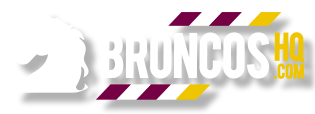Please note: Aboriginal and Torres Strait Islander people are advised that this article contains names and images of people who have passed away.
With the eyes of the rugby league world watching the NRL season opener in Las Vegas, Ezra Mam stood like a warrior in defence of his Indigenous culture and used his voice to speak out.
Those that don't know the at times shy 21-year-old might have been surprised with his conviction and confidence to stand tall.
But for a man who has the faces of his trailblazing grandparents tattooed on his chest alongside the names of his parents, there wasn't even really a decision to make.
"They basically raised me from a young age and they were very strict on culture," Mam said of his grandparents. "Being raised by them made me who I am and I learned from their values as well.
"I didn't really have an option to not do any sort of culture stuff. Having those traditions growing up, I just had to be forced into cultural protocols, but I'm very grateful for that now. Being able to celebrate and promote a special culture is one of the best things that could have happened to me.
"It holds me to my morals and to our cultural etiquette."
Mam's grandparents are what makes both his rich cultural heritage – both Torres Strait Islander and mainland Aboriginal – but also his strong moral convictions.
His grandmother Aunty Pamela Mam – was a pioneer in health care as one of the first Indigenous nurses in Queensland, later becoming the patron of the Institute of Urban Indigenous Health, while grandfather Uncle Steve Mam played a key role in many First Nations community and representative organisations.
An Indigenous activist, he was also heavily involved during the ground-breaking Eddie Mabo High Court hearing on Native Title.
“I was brought up more towards the Torres Strait side with my grandfather's side of the family and he was really strong with that culture," Mam said.
"I've been learning about my Aboriginal culture on the other side – I still have a connection to our family on Palm Island, so it's always good to reach out to them and practice those cultures though of the differences.
“Growing up, my grandfather was always strong in what he said... being a warrior and standing up for who you are and being yourself.
"Being the main leader and a chief, as well as holding yourself like a warrior. That's what I mean by being strong and standing up for yourself.
"I wouldn't say I've learned everything. I hold myself strong to my culture and that's the lifestyle I like to live, so I'm fortunate to be representing."
It's against this backdrop and understanding that Mam – who has performed with a dance troupe founded by his grandfather previously in Indigenous Round – has grown to be a leader in sharing his culture.
Teammate Jordan Riki, who is making his first steps into learning more about his Indigenous background, said Mam had been a key figure in helping him discover more about his Indigenous Australian identity.
“It's funny saying that he's taking me under his wing, because he's a lot younger than me, but he definitely has,” Riki said.
“He gets around the whole team and teaches some of the boys some traditional TSI dancers and stuff like that in the gym. If the good music's going, he'll get out and bust some moves and we're all trying to learn from him.
"The awesome thing is that the whole team gets around it. It's not just the Indigenous or boys with culture, the whole team fully buys into it."
Away from the Red Hill dance floor and his on-field brilliance at Suncorp Stadium, Mam also spends his time as an ambassador for Indigenous health and advocacy group Deadly Choices.
With his family upbringing and with his role off the field, Mam will always make a stand for his culture and has encouraged others who are in the early stages of exploring their own cultural identity, like Riki, to continue to reach out.
“It's always good to take that first step and there's always pathways to reach out and learn about your culture,” Mam said. “It's all about taking the next step and learning your culture and reaching out to whoever you can.
“Don't be bored of knowing who you are, just keep exploring yourself and get to know your culture and embrace a different side of what you know.
“That's why we're very grateful to be expressing our culture to the community.
"Indigenous Round holds a special place in our hearts, but for our people as well. It's a special moment for me to represent myself, but also to represent our people and all the people that have gone before us as well."
NRL.com






